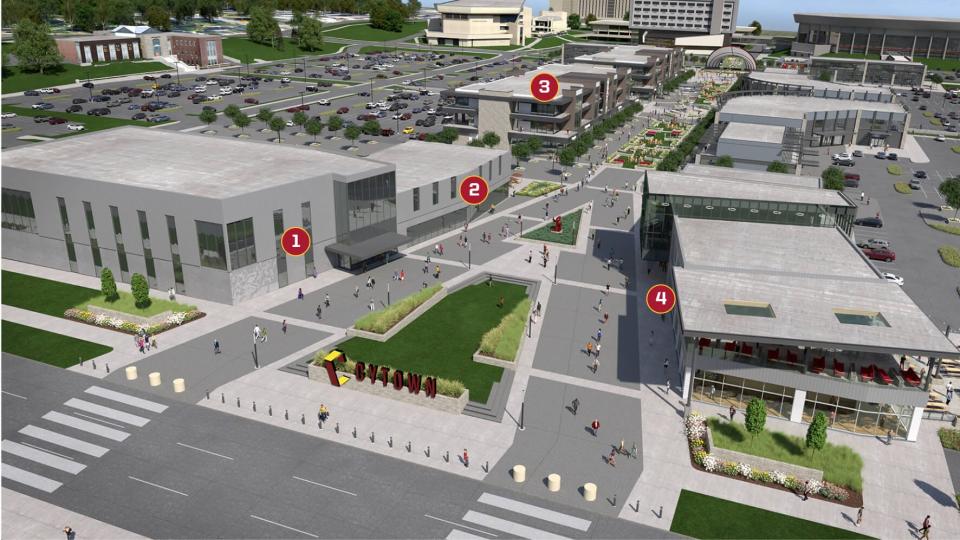
Iowa State University’s $200 million CYTown development may be exempt from paying property taxes if an agreement with the City of Ames passes.
The pending Memo of Understanding (MOU) contract would allow ISU Athletics to collect rent from CyTown tenants and not pay city taxes, as long as the money is allocated to the Iowa State Center.
The 40-acre CYTown development will include collection of retail, residential, office, and medical facilities between the Iowa State Center and Jack Trice Stadium. The first phase of construction is already underway, which Iowa State expects to complete by August 2025.
Iowa State began exploring the feasibility of a multi-use arts, culture, and community district in 2019. Their intent was to develop the underutilized parking lots between Jack Trice Stadium and the Iowa State Center, which inspired the CYTown project.
A primary initial goal of CYTown is to generate revenue for renovations of the Iowa State Center’s four original buildings.
Future renovations at Hilton Coliseum, Stephen’s Auditorium, Fisher Theatre, and the Scheman Building, which were built from 1969 to 1975, are estimated to cost around $110 million.
More: Ames, CYTown partnering to fund future renovations of four Iowa State Center buildings


Ames, Iowa State working out PILOT compromise
The City of Ames and Iowa State University disagree on whether the university should be required to pay property taxes for CYTown.
Ames City Manager Steve Schainker said an elongated disagreement over property taxes could have a negative effect on the Iowa State Center renovations, possibly fracturing a long, successful partnership.
“Over the years, the relationship between the City of Ames and Iowa State University has served as a role model for town/gown relationships with countless partnerships that benefit both entities,” Schainker said. “A protracted dispute with respect to the issues of taxability and competition would be detrimental to the parties’ relationship and could delay or altogether thwart the renovation and improvement of the Iowa State Center facilities.”
Instead, the two entities have designed a creative agreement to avoid such a dispute.
The Memo of Understanding calls for a Payment In Lieu Of Taxes (PILOT), which Schainker said would allow the Iowa State Center improvements to move forward without delay. The PILOT would generate revenue from CYTown to finance the needed capital improvements for the four Iowa State Center buildings. It “sets aside any differences of opinion that may exist about the issues of competition and taxation.”
The PILOT agreement will only apply to the CYTown development. It does not imply the city’s approval or cooperation with any of Iowa State’s future land development.
More: Wrongful death jury trial cancelled, unspecified settlement headed to Board of Appeals
CYTown progress
McFarland Clinic is the only tenant to sign onto the CyTown development so far, announcing its plans last September. In its initial release, the medical clinic said it planned to break ground on a 60,000-square-foot multi-level medical facility near the football stadium this summer.
ISU recently announced that it had picked Goldenrod Companies to lead the design, development, financing, and construction of CyTown.
Goldenrod was founded in 2005 in Omaha, Nebraska. It operates and manages more than 8.5 million square feet of commercial property nationwide. Goldenrod was the lead developer for the University of Nebraska’s 2.2 million square foot Innovation Campus and has also helped develop campuses for Colorado State University.
More: Iowa State’s CYTown development ahead of schedule, $4 million under budget
What would happen under the MOU agreement?
ISU News Service Director Angie Hunt said a PILOT will be included in the rental agreements for commercial CYTown tenants. The amount will be equivalent to what commercial tenants would pay in property taxes if the development were on privately owned property.
According to Iowa Code Section 427.1, property owned by the State of Iowa, including Iowa State University property, is exempt from property taxes.
Hunt said some of ISU’s future PILOT funds would be given back to the City of Ames for its general fund. It’s an agreement that is vital to the city and Iowa State’s longstanding relationship.
“Redevelopment of the Iowa State Center is a vital interest to both the university and the city to continue and enhance the availability of and support for the performing arts,” Hunt said.
The amount of funds being used for rehabilitation will depend on the assessed value of new buildings in the CYTown development, Hunt said.
“The city assessor will determine that value once construction of a building is complete,” Hunt said. “The PILOT will be based on the assessed value and equivalent to what the city would collect in property tax for a similar commercial property.”
The City Assessor and the Iowa Department of Revenue, both of which are independent of the City of Ames, determine a property’s taxability.
Schainker said the drafted Memo of Understanding will hopefully appear before the Ames City Council on Tuesday, May 14 or Tuesday, May 28.
ISU Director of Athletics Jamie Pollard declined to comment for this story.
More: Iowa State University selects developer for $200 million CYTown project
Celia Brocker is a government, crime, political and education reporter for the Ames Tribune. She can be reached at CBrocker@gannett.com.
This article originally appeared on Ames Tribune: Iowa State and Ames consider tax agreement for CYTown development